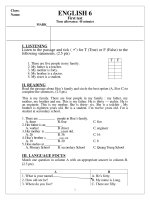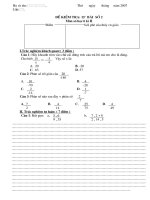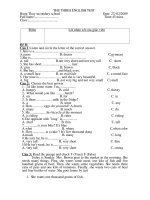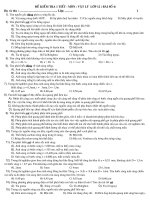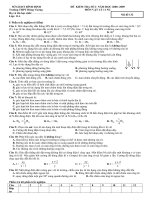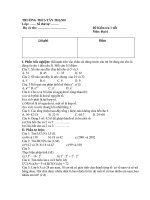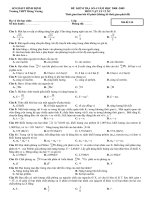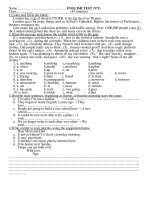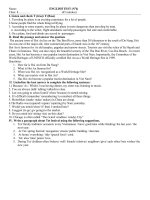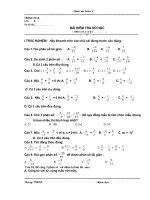De kiem tra so 14512HS yeu
Bạn đang xem bản rút gọn của tài liệu. Xem và tải ngay bản đầy đủ của tài liệu tại đây (120.23 KB, 7 trang )
<span class='text_page_counter'>(1)</span>lWRITTEN TEST 45’ (No1) Full name: ………………………………… Class: 12A…. I. Listening: (2.0pts) Listen to some information about a wedding ceremony in Vietnam and decide whether the following statements are true (T) or false (F) Ex: 0. Wedding is not very important to the Vietnamese. F 1. The wedding day is usually chosen carefully by the groom’s parents. ………… 2. The boys who hold the trays of gifts are also carefully chosen. ……….... 3. An old man will introduce the groom, the bride, the parents, the relatives and guests of two families. ………… 4. The wedding ceremony starts in front of the door of the groom’s house. ………... 5. During the wedding banquet, the groom, bride and their parents stop by each table to say goodbye to their guests. ……….. 6. The bride and the groom would sit down, begging their ancestors’ permission to get married. ……… 7. The groom and the bride exchange the wedding rings after they pray and ask their ancestors’ permission to get married. ……….. 8. A wedding banquet is often held at the groom’s house or at a restaurant or a hotel. ……….. II. Pronunciation: (1.0pt) Chọn từ có phần gạch chân được phát âm khác với 3 từ còn lại: 9. A. plays B. lives C. needs D. speaks 10. A. wanted B. needed C. rained D. decided 11. A. stopped B. lived C. arrived D. phoned Chọn từ có trọng âm được nhấn vị trí khác với 3 từ còn lại: 12. A. certain B. couple C. decide D. equal III. Grammar and vocabulary: (2.5pts) Choose the correct option (A, B, C or D) to complete the sentences 13. I …………this film three times so I don’t want to see it any more A. have seen B. see C. was seeing D. is seeing 14. They ……………many photos about Hoan Kiem lake last year. A. had taken B. took C. take D. is taking 15. My children have bought some gifts. They ……………..a birthday party with their friends tonight. A. attend B. will attend C. are attending D. have attended 16. Huy: I thought your game was a lot better today, Minh. Minh: ………………….. I thought it was terrible. A. You must be kidding! B. I don’t like it! C. Don’t think so! D. That’s a nice compliment! 17. Many Indian students agree that a woman has to ……………more in a marriage than a man. A. maintain B. trust C. sacrifice D. agree 18. I often ……………my secrets with my mother because she understands me very much. A. speak B. share C. give D. talk 19. In America, it is ………….to ask questions about ages, marriages and income. A. polite B. politeness C. impoliteness D. impolite 20. I am sure we...............the work soon. A. had finished B. finish C. finished D. will finish 21. My classmates...................to Ha Long Bay two weeks ago. A. go B. have gone C. went D. are going 22. By the end of this month, the workers ...................................the project. A. finished B. have finished C. finish D. will have finished IV. Reading: (2.5pts) Read the passage and choose the best answer (A, B, C or D) from 23 to 27: In the United States and Canada, it is very important to look a person directly in the eyes when you are having a conversation with him or her. If you look down or to the side when the other person is talking, that person will think that you are not interested in what he or she is saying. This, of course, is not polite. If you look down or to the side when you are talking, you may appear to be hiding something; that is, it might seem that you are not honest. However, people who are speaking will sometimes look away for a few seconds when they are thinking or trying to find the right word. But they always turn immediately back to look the listener directly in the eyes. These social ‘rules’ are the same for two men, two women, a man and a woman or an adult and a child..
<span class='text_page_counter'>(2)</span> 23. In the US and Canada, when you are having a conversation with someone, ………… . A. do not look directly in the eyes. B. it is impolite to look at the eyes of the speaker or hearer. C. you should look him or her directly in the eyes. D. you should look away 24. If you look down or to the side when the other person is talking, …………….. A. you will be thought to be not interested in the conversation. B. you are very interested in what is being said. C. you are very polite. D. you are interested in the person 25. If you look down or to the side when you are talking, ……………..….. A. the Americans are interested in you. B. you are thought to be dishonest C. you are very polite D. you are interested in the conversation 26. The speakers will sometimes look away because ……………….… A. they want to end the conversation B . they think that the hearers are not honest. C. the hearers are interested in what is being said. D. they are thinking or finding the right word. 27. These social ‘rules’ are ……………… A. for men only B. for women only C. for children only D. the same for everybody V. Writing: (2.0pts) A.Chọn câu viết đúng với câu đã cho (ứng với A, B, C hoặc D) 28. “I’ll come to see you here next Sunday”, Bill told me. A. Bill promised to come to see me there the next Sunday. B. Bill promised to come to see me here the next Sunday. C. Bill offered to come to see me there the next Sunday. D. Bill suggested I come to see me there the next Sunday. 29. “Do you like playing football?”, Mary asked me. A. Mary asked me if I like playing football. B. Mary asked me if I liked playing football. C. Mary asked me if you like playing football. D. Mary asked me if you liked playing football. 30. “Where do your parents work?”, Mr Hung asked Hanh A. Mr Hung asked Hanh where your parents worked B. Mr Hung asked Hanh where do her parents work C. Mr Hung asked Hanh where do her parents worked D. Mr Hung asked Hanh where her parents worked 31. “ I met your sister at a bookshop yesterday”, Hoa said A. Hoa said she met my sister at a bookshop the day before. B. Hoa said she had met your sister at a bookshop the day before. C. Hoa said she had met my sister at a bookshop the day before. D. Hoa said she had met my sister at a bookshop yesterday. B. Chuyển sang câu gián tiếp (Turn into reported speech). 32. “I haven’t met him for a long time”, Miss Lan said ………………………………………………………………………………. . 33. “Where did you go last summer?”, Peter asked Mary ………………………………………………………………………………. . 34. “Are you a student?”, the tourist asked me ……………………………………………………………………………….. . 35. “Does your brother live here?”, Jack asked me ……………………………………………………………………………….. . -----The end-----.
<span class='text_page_counter'>(3)</span> WRITTEN TEST 45’ (No1) Full name: ………………………………… Class: 12A…. I. Listening: (2.0 pts) Listen to some information about a wedding ceremony in Vietnam and decide whether the following statements are true (T) or false (F) Ex: 0. Wedding is not very important to the Vietnamese. F 1. The wedding day is usually chosen carefully by the bride’s parents. ………… 2. The boys who hold the trays of gifts are also carefully chosen. ………... 3. An old man will introduce the groom, the bride, the parents, the relatives and guests of two families. ………. 4. The wedding ceremony starts in front of the altar. ……….. 5. The bride and the groom would sit down, begging their ancestors’ permission to get married. …….. 6. The groom and the bride exchange the wedding rings after they pray and ask their ancestors’ permission to get married. ……… 7. A wedding banquet is often held at the relatives’ house or at a small pub. …….. 8. During the wedding banquet, the groom, bride and their parents stop by each table to say goodbye to their guests. ……….. II. Pronunciation: (1.0 pt) Chọn từ có trọng âm được nhấn vị trí khác với 3 từ còn lại: 9. A. handsome B. country C. thinking D. invite Chọn từ có phần gạch chân được phát âm khác với 3 từ còn lại: 10. A. stopped B. lived C. arrived D. phoned 11. A. wanted B. needed C. rained D. decided 12. A. plays B. lives C. needs D. speaks III. Grammar and vocabulary: (2.5pts)Choose the correct option (A, B, C or D) to complete the sentences 13. You can .............your attention with everyone by nodding, whistling or clapping your hands. A. make B. attract C. say D. ignore 14. Both my parents……………hands to give us a nice house and a happy home. A. clap B. join C. have D. make 15. We..............English for ten years. A. have been learning B. were learning C. learn D. are learning 16. Ha : ‘You really have a beautiful dress, Hoa. I’ve never seen such a perfect think on you.’ Hoa : ‘...................... I bought it at a fashionable shop 2 days ago.’ A. You’ve got to be kidding ! B. I’m glad you like it ! C. Me,too D. No, thanks 17. I am sure we...............the work soon. A. had finished B. finished C. finish D. will finish 18. My father ....................French since he traveled to Paris. A. learned B. have learned C. learns D. is learning 19. He ............5 minutes ago so I couldn’t meet him. A. left B. has left C. leaves D. will leave 20. Small children are often told that it is rude to point ………….other people. A. on B. at C. with D. for 21. They ……………many photos about Ha Long Bay last year. A. had taken B. take C. took D. is taking 22. My parents ……………..busy recently. A. are B. had been C. have been D. were IV. Reading: (2.5pts) Read the passage and choose the best answer from 23 to 27: In the United States and Canada, it is very important to look a person directly in the eyes when you are having a conversation with him or her. If you look down or to the side when the other person is talking, that person will think that you are not interested in what he or she is saying. This, of course, is not polite. If you look down or to the side when you are talking, you may appear to be hiding something; that is, it might seem that you are not honest. However, people who are speaking will sometimes look away for a few seconds when they are thinking or trying to find the right word. But they always turn immediately back to look the listener directly in the eyes. These social ‘rules’ are the same for two men, two women, a man and a woman or an adult and a child..
<span class='text_page_counter'>(4)</span> 23. In the US and Canada, when you are having a conversation with someone, ………… . A. it is impolite to look at the eyes of the speaker or hearer. B. do not look directly in the eyes. C. you should look away D. you should look him or her directly in the eyes. 24. If you look down or to the side when the other person is talking, ……………... A. you are very interested in what is being said. B. you will be thought to be not interested in the conversation. C. you are interested in the person D. you are very polite. 25. If you look down or to the side when you are talking, ……….. A. you are very polite B. you are interested in the conversation C. the Americans are interested in you. D. you are thought to be dishonest 26. The speakers will sometimes look away because ………… A. they are thinking or finding the right word. B . the hearers are interested in what is being said. C. they think that the hearers are not honest. D. they want to end the conversation 27. These social ‘rules’ are ………… A. the same for everybody B. for children only C. for women only D. for men only V. Writing: (2.0 pts) A.Choose the correct option ( A, B, C or D) 28. “Where do your parents work?”, Mr Hung asked Hanh A. Mr Hung asked Hanh where do her parents work B. Mr Hung asked Hanh where your parents worked C. Mr Hung asked Hanh where do her parents worked D. Mr Hung asked Hanh where her parents worked 29. “I’m sorry I didn’t ring you earlier”, Tom said to me. A. Tom asked me to say sorry to him for not ringing him earlier. B. Tom I said sorry to Tom because I didn’t ring him earlier. C. Tom apologized to me for not ringing you earlier. D. Tom apologized to me for not ringing me earlier. 30. “ I met your sister at a bookshop yesterday”, Hoa said A. Hoa said she met my sister at a bookshop the day before. B. Hoa said she had met my sister at a bookshop the day before. C. Hoa said she had met your sister at a bookshop the day before. D. Hoa said she had met my sister at a bookshop yesterday. 31. “Do you like playing football?”, Mary asked me. A. Mary asked me if you liked playing football. B. Mary asked me if I liked playing football. C. Mary asked me if you like playing football. D. Mary asked me if I like playing football. B. Chuyển sang câu gián tiếp (Turn into reported speech). 32. “My friend doesn’t enjoy getting up early ”, he said ………………………………………………………………………………. . 33. “You can do this work now”, the manager said to me The manager told ………………………………………………………………………………. . 34. “What time does the train leave?”, the passenger asked me ……………………………………………………………………………….. . 35. “Do your children learn Maths well at school?”, she asked me ……………………………………………………………………………….. . ----The end----.
<span class='text_page_counter'>(5)</span> WRITTEN TEST 45’ (No1) Full name: ………………………………… Class: 12A…. I. Listening: (2.0 pts) Listen to some information about a wedding ceremony in Vietnam and decide whether the following statements are true (T) or false (F) Ex: 0. Wedding is not very important to the Vietnamese. F 1. The wedding day is usually chosen carefully by the groom’s parents. ………… 2. The boys who hold the trays of gifts are also carefully chosen. ……….... 3. A master of ceremony will introduce the groom, the bride, the parents, the relatives and guests of two families. ………… 4. The wedding ceremony starts in front of the altar. ………... 5. The bride and the groom would sit down, begging their ancestors’ permission to get married. ………... 6. The groom and the bride exchange the wedding rings before they pray and ask their ancestors’ permission to get married. …………. 7. A wedding banquet is often held at the groom’s house or at a restaurant or a hotel. …….. 8. During the wedding banquet, the groom, bride and their parents stop by each table to thank their guests. ……….. II. Pronunciation: (1.0 pt) Chọn từ có trọng âm được nhấn vào vị trí khác với 3 từ còn lại: 9. A. worker B. classroom C. provide D. meeting Chọn từ có phần gạch chân được phát âm khác với 3 từ còn lại: 11. A. wanted B. needed C. decided D. rained 10. A. stopped B. arrived C. lived D. phoned 12. A. lives B. plays C. needs D. speaks III. Grammar and vocabulary: (2.5pts)Choose the correct option (A, B, C or D) to complete the sentences 13. My father ....................French since he traveled to Paris. A. learned B. have learned C. learns D. is learning 14. He ............5 minutes ago so I couldn’t meet him. A. left B. has left C. leaves D. will leave 15. They ……………many photos about Ha Long Bay last year. A. had taken B. take C. took D. is taking 16. My parents ……………..busy recently. A. are B. had been C. have been D. were 17. Most of us would maintain that physical ………….does not play a major part in how we react to the people we meet. A. attract B. attractive C. attractiveness D. attractively 18.Mrs. Pike was so angry that she made a………….gesture at the driver. A. rudely B. rudeness C. rude D. rudest 19. What an attractive hair style you have got, Mary! - “………………” A. Thank you very much. I am afraid B. Thank you for your compliment C. You are telling a lie D. I don’t like your sayings 20.Mai takes responsibility………………. running the household. A. up B. at C. in D. for 21.When you see your teacher approaching you, a slight wave to attract his attention is appropriate. A. coming nearer to B. catching sight of C. pointing at D. looking up to 22.How may times………………them so far? A. had you seen B. did you see C. were you seeing D. have you seen IV. Reading: (2.5pts) Read the passage and choose the best answer from 23 to 27: In the United States and Canada, it is very important to look a person directly in the eyes when you are having a conversation with him or her. If you look down or to the side when the other person is talking, that person will think that you are not interested in what he or she is saying. This, of course, is not polite. If you look down or to the side when you are talking, you may appear to be hiding something; that is, it might seem that you are not honest. However, people who are speaking will sometimes look away for a few seconds when they are thinking or trying to find the right word. But they always turn immediately back to look the listener directly in the eyes. These social ‘rules’ are the same for two men, two women, a man and a woman or an adult and a child..
<span class='text_page_counter'>(6)</span> 23. In the US and Canada, when you are having a conversation with someone, ……….…… . A. it is impolite to look at the eyes of the speaker or hearer. B. you should look away C. do not look directly in the eyes. D. you should look him or her directly in the eyes. 26. The speakers will sometimes look away because …………..……… A. they are thinking or finding the right word. B. they think that the hearers are not honest. C . the hearers are interested in what is being said. D. they want to end the conversation 25. If you look down or to the side when you are talking, ……………….... A. you are thought to be dishonest B. you are interested in the conversation C. the Americans are interested in you. D. you are very polite 24. If you look down or to the side when the other person is talking, ……………... A. you are very polite. B. you are very interested in what is being said. C. you are interested in the person D. you will be thought to be not interested in the conversation. 27. These social ‘rules’ are ………………..… A. for men only B. for women only C. for children only D. the same for everybody V. Writing: (2.0 pts) A.Choose the correct option ( A, B, C or D) 28. “ I met your sister at a bookshop yesterday”, Hoa said A. Hoa said she met my sister at a bookshop the day before. B. Hoa said she had met my sister at a bookshop the day before. C. Hoa said she had met your sister at a bookshop the day before. D. Hoa said she had met my sister at a bookshop yesterday. 29. “Do you like playing football”, Mary asked me. A. Mary asked me if you liked playing football. C. Mary asked me if you like playing football. B. Mary asked me if I liked playing football. D. Mary asked me if I like playing football. 30. “Where do your parents work?”, Mr Hung asked Hanh A. Mr Hung asked Hanh where her parents worked B. Mr Hung asked Hanh where your parents worked C. Mr Hung asked Hanh where do her parents worked D. Mr Hung asked Hanh where do her parents work 31. “ If I were you, I would go to see the doctor”,David said to Claudia. A. David asked Claudia not to go to see the doctor. B. David told Claudia to become a doctor. C. David advised Claudia to go to see the doctor. D. David told Claudia that he would go to see the doctor. B. Chuyển sang câu gián tiếp (Turn into reported speech). 32. “My sisters don’t like eating bananas ”, she said ………………………………………………………………………………. . 33. “I will go for a picnic with you tomorrow”, my boyfriend said to me My boyfriend told ………………………………………………………………………………. . 34. “What time did you go to bed last night?”, the teacher asked me ……………………………………………………………………………….. . 35. “Can you draw well at school?”, she asked me ……………………………………………………………………………….. . ---The end----.
<span class='text_page_counter'>(7)</span> * Tapescript: Listen to some information about a wedding ceremony in Vietnam and decide whether the following statements are true (T) or false (F) Wedding is very important to the Vietnamese, not only to the couple involved, but also for both families. The wedding day is usually chosen carefully by the groom’s parents. On the wedding day, the groom’s family and relatives go to the bride’s house bringing gifts wrapped in red papers. The boys who hold the trays of gifts are also carefully chosen.There is a Master of the Ceremony who will introduce the groom, the bride, the parents, the relatives and guests of two families. The wedding ceremony starts in front of the altar. The bride and the groom would pray, asking their ancestors’ permission to get married. The Master of the Ceremony would give the wedding couple advice on starting a new family. The groom and the bride then exchange the wedding rings. Then everybody has a wedding banquet which is often held at the groom’s house or at a restaurant or a hotel. During the wedding banquet, the groom, bride and their parents stop by each table to thank their guests..
<span class='text_page_counter'>(8)</span>
